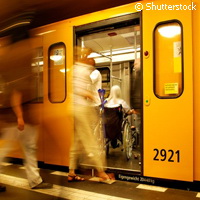EU research cuts train delays
Train passengers across Europe are benefiting from new EU-funded research on algorithms. Waiting times for underground trains in Germany have been halved and there have been huge impacts in Italy, the Netherlands and Switzerland as well. The ARRIVAL ('Algorithms for robust and online railway optimisation: improving the validity and reliability of large scale systems) project developed advanced software that allows network operators to schedule trains more efficiently while also proposing solutions in real time to unforeseen disruptions. 'This first class European research allows more passengers, more freight and goods on more trains to safely use the same infrastructure while increasing punctuality, passenger satisfaction, and operator profit,' said EU Digital Agenda Commissioner Neelie Kroes. 'It's a win-win situation for everyone.' Sound planning in the first place, combined with the avoidance of a domino effect when a disruption occurs, is the key to effective planning and minimising travel delays. Traditionally rail operators have had very few information technology (IT) tools at their disposal when a disruption has occurred. Graphic software allowing operators to visualise problems has been a help, but every train user knows that room for improvement remained. The new system covers the web of elements involved in planning, from timetables to platform allocation, staff distribution and freight loads. The algorithms have not only cut waiting time between trains from four minutes to two on the Berlin underground network, but have also been used to draw up a new timetable for the Dutch national railway system, which handles 5,500 trains per day. In Switzerland, the system has been used to optimise a schedule so that additional trains may operate on high-risk sections of track, while trials at the Italian stations of Palermo and Genoa have reduced delays by 25%. The ARRIVAL project received EUR 2.6 million of its EUR 3.2 million total cost from the information society technologies (IST) section of the Sixth Framework Programme (FP6). It brought together researchers from 12 universities in Germany, Greece, Italy, the Netherlands, Spain and Switzerland with the French rail company SNCF (Société Nationale des Chemins de fer Français).
Countries
Switzerland, Germany, Greece, Spain, France, Italy, Netherlands



